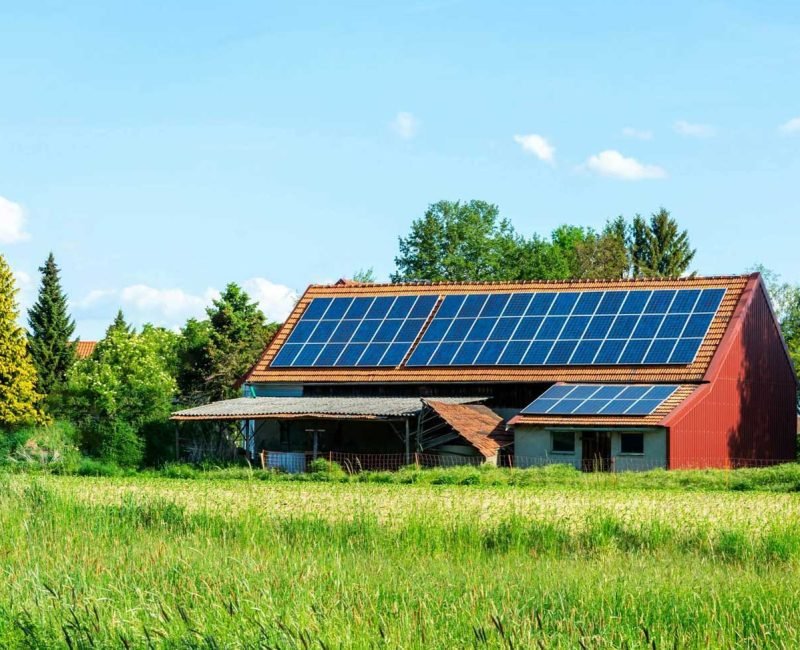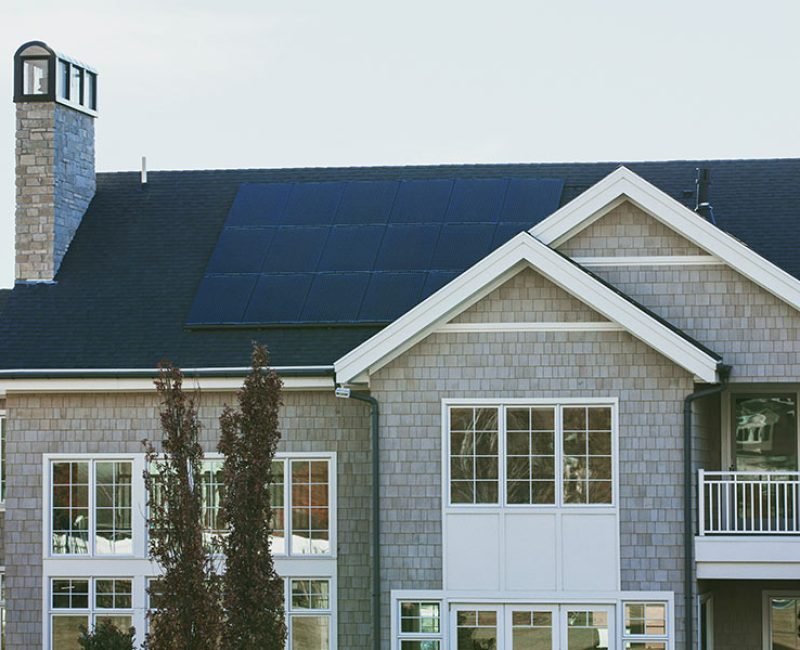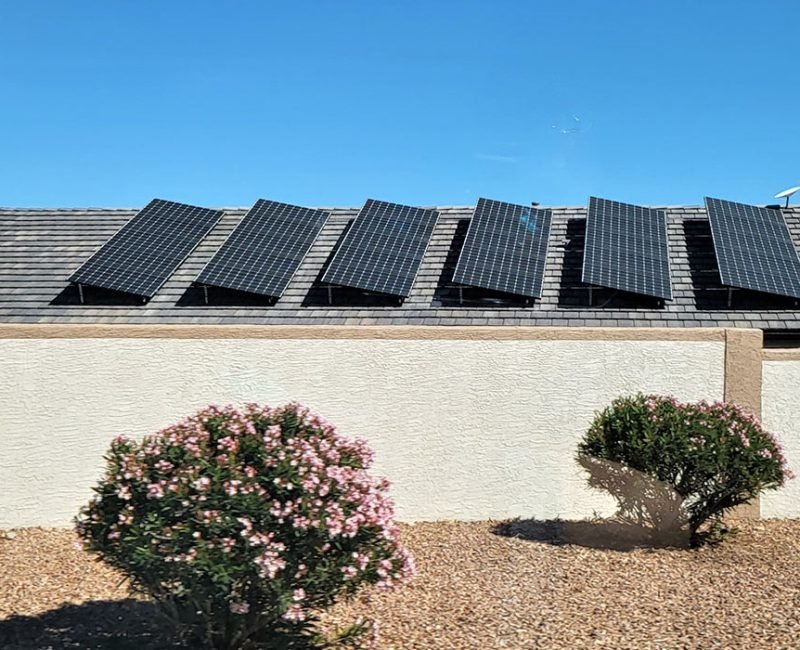Agricultural Solar
1. Lower Energy Costs
By installing solar panels, a farm can produce its own electricity, reducing its reliance on the grid and significantly lowering energy expenses.
POULTRY FARM
FOOD PROCESSING
COLD STORAGE

2. Increased Energy Independence
By producing their own electricity, farmers can achieve greater self-sufficiency, reducing their dependence on external energy providers.
PACKING HOUSE
WINERIES AND WINEYARD
TREE NUT GROWERS

3. Environmental Benefits
Solar energy is a sustainable and eco-friendly power source, helping farms reduce their carbon footprint and promote a cleaner, healthier environment.
ROW CROP GROWERS
LEMON GROWERS
PISTACHIOS

4. Enhanced Farm Profitability
Lower energy costs help boost a farm’s profitability, ensuring greater long-term sustainability and financial stability.
WALNUT GROWERS
ALMONDS GROWERS
GRAPE GROWERS AND ORCHARDS

5. Additional Revenue Opportunity
A farm can earn extra income by selling surplus solar energy back to the grid or participating in community solar programs.
WHY GROWERS GO SOLAR
DIARY FARM

6. Higher Property Value
Installing solar panels can increase a farm’s property value, making it a more appealing and valuable investment.

7. Incentives and Tax Benefits
Governments often provide incentives and tax credits to promote solar energy adoption, helping farms lower installation costs and make solar a more affordable choice.

R.E.A.P. Grant Overview
What does this program do?
The R.E.A.P. program offers guaranteed loan financing and grant funding to agricultural producers and small rural businesses to support renewable energy projects or improve energy efficiency. Agricultural producers can also apply for loans to purchase new energy-efficient equipment and systems for agricultural production and processing.
Who may apply for this program?
- Agricultural producers who earn at least 50% of their income from agricultural operations.
- Small businesses located in eligible rural areas.
Note: Applicants must not have any outstanding delinquent federal taxes, debts, judgments, or debarment.
What funding is available?
- Loan guarantees covering up to 80% of total eligible project costs.
- Grants for up to 40% of total eligible project costs.
- Combined funding options, offering grants and loan guarantees, for up to 80% of total eligible project costs.
What are the loan guarantee terms?
The loan term will be established by the lender, with agency approval, based on factors such as the purpose of the loan, the economic life of the assets financed, and the borrower’s ability to repay. The loan term will not exceed 40 years.
65% Energy Savings – Minimum
With the new solar panels now fully operational, he is set to save at least 65% on his energy bills, with the potential for savings to reach up to 75%, depending on various factors. Since solar energy efficiency can vary, these savings are an estimate, not an exact prediction.
A 65% savings means a reduction of at least $8,775 per year in energy costs. Combined with tax incentives, he will recover the full cost of his solar energy system within 5 years. Given that the system is warranted to last at least 25 years, he will benefit from free electricity for the next 20 years.
Since other operating expenses stay relatively stable, all these savings translate into pure profit. Without any additional effort—no marketing, no business expansion, no major remodeling, and no other energy-saving investments—he will be pocketing almost $10,000 in extra profits annually.
And, regardless of political views, if a carbon tax is ever introduced, farms with solar systems stand to save even more.
Poultry Farms
This farmer operates a 6-house poultry farm and was facing unpredictable and steadily rising utility bills from Georgia Power, now totaling about $13,500 annually. Given that gas and electricity are his primary expenses due to his agreements with Tyson and other chicken processors, any savings he can achieve will significantly improve his long-term profitability.
With energy costs increasingly eating into his profits each year, he decided to take advantage of available tax credits and incentives for solar panels. After consulting with a Coastal Solar representative, he discovered three key reasons why solar was the right choice for his farm:
- Long, Flat Roofs – Perfect for solar panel installation, providing ample space for panels.
- No Loss of Ground Space – The panels will be installed on the roofs, keeping valuable land available for farming.
- Southern Exposure – His south-facing roofs will capture the most sunlight, maximizing the solar system’s energy production.
Food Processing
The journey of moving food from the farm to the table is highly energy-intensive, consuming up to 10 percent of the total energy budget in the United States, according to the NRDC. Food processing plants are crucial in this value chain, as farmers rely on them to maximize the value of their harvest. Distributors and customers expect the highest standards of food quality, safety, and sustainability. Solar energy offers an economically and environmentally sustainable solution, helping food processing plants reduce (or even eliminate) their energy costs while promoting long-term sustainability.
Cold Storage Facilities
Cold storage facilities consume a significant amount of energy, often having the highest demand among industrial businesses. As consumer preferences shift toward fresher foods and ready-to-eat frozen meals, cold storage facility owners must keep pace with growing demand. Solar energy can be a game-changer for these facilities, offering a cost-effective and environmentally sustainable solution to reduce, or even eliminate, energy expenses while meeting the increasing energy needs.
Packing Houses
Packing houses are crucial in ensuring that food from the farm reaches the table, and growers rely on them to maximize the value of their harvest. As a packing house owner, your business decisions balance your responsibility to growers with your commitment to delivering high-quality products. Solar energy offers an economically and environmentally sustainable solution to help reduce or even eliminate your energy costs. For packing houses with energy bills over $50,000 a month, investing in solar makes strong financial sense.
Wineries & Vineyards
Sustainability has become essential for California wineries. By November 2017, 74% of wineries in the state were Certified Sustainable, highlighting their commitment to energy and water conservation, soil health, habitat preservation, and more. Many wineries now promote their sustainability efforts right on the wine bottle, which has become a key selling point for consumers. For an increasing number of vintners, solar energy is a vital part of their sustainability strategy, helping to significantly reduce or even eliminate energy costs.
We understand that transitioning to solar impacts many aspects of your winery. A large-scale production winery has different needs than a boutique winery or tasting room, which is why we offer customized solar solutions tailored to fit your specific business. From day one, we’ll work with you to ensure you—and your customers—quickly see the benefits and value of your solar investment.
Tree Nut Growers
California tree nut growers face numerous challenges that can affect their bottom line, including fluctuating market conditions, labor shortages, a shift towards automation, and rising energy costs. According to a USDA study, growers could be spending up to 6% of their operating expenditures on energy. Given these high costs, it’s worth considering solar energy. With federal and state incentives, along with California’s Net Energy Metering Aggregation (NEMA), solar energy offers a chance to greatly improve the return on investment (ROI) for tree nut growers. Coldwell Solar, California’s #1 family-owned commercial solar company, has been helping growers in the agricultural sector—such as tree nut, citrus, grape, and row crop growers—significantly reduce or eliminate their energy costs since 1986.
Food Processing
The food processing industry is highly energy-intensive, consuming up to 10% of the total U.S. energy budget, according to the NRDC. Food processing plants are essential in moving food from farm to table, and growers rely on these facilities to maximize the value of their harvest. Distributors and consumers demand the highest standards of food quality, safety, and sustainability. Solar energy offers an economically and environmentally sustainable way for food processors to lower or even eliminate their energy costs.
Cold Storage
Cold storage facilities are some of the highest energy consumers among industrial businesses. As consumer demand grows for fresher foods and ready-to-eat frozen meals, cold storage facilities need to keep up. Solar can be a game-changer for these businesses, providing an economically and environmentally sustainable solution to reduce or eliminate energy costs.
Packing Houses
Packing houses are crucial in ensuring that food from farms makes it to the table. Growers rely on packing houses to maximize the value of their harvest, while businesses must consider both their responsibility to growers and their commitment to producing high-quality products. Solar energy is an economically and environmentally sustainable way for packing houses to lower or eliminate energy costs. For packing houses with energy bills exceeding $50,000 a month, solar is a financially sound investment.
Row Crop Growers
Row crop growers in California face a range of challenges that impact their bottom line, including unpredictable weather, fluctuating market conditions, and labor shortages. A recent USDA study shows that energy bills could account for up to 6% of operating costs. With such high expenses, it’s worth considering solar energy. Federal and state incentives, along with California’s Net Energy Metering Aggregation (NEMA), offer opportunities to dramatically improve the return on investment (ROI) for row crop growers. Coldwell Solar, California’s #1 family-owned commercial solar company, has partnered with 15 growers to install over 6 megawatts of solar. Founded in 1986, we specialize in tailoring solar solutions for row crop growers, whether you’re cultivating cotton, strawberries, lettuce, or other crops. We work with you to ensure your business gets the best solar solution.
Lemon Growers
For many citrus growers, farming is a family tradition passed down through generations. Citrus growing is more than just a job; it’s a way of life. However, citrus growers in California and Florida face various challenges that affect production, and finding new ways to maximize output while reducing operational costs is crucial. Solar energy offers a way to cut or even eliminate electricity costs, while also ensuring that you’re making a sound investment for the future of your citrus grove—both for this generation and the next.
At Coldwell Solar, we understand that transitioning to solar is a decision that impacts many aspects of your citrus business. Founded in 1986, Coldwell Solar is California’s #1 family-owned commercial solar company and one of the largest solar companies in the country. We work alongside citrus growers to help you significantly reduce or eliminate energy costs, ensuring a more sustainable future for your grove.
Pistachio Growers
Growing pistachios comes with its challenges, especially when it comes to predicting harvest yields. With so much unpredictability in the industry, rising energy costs are one thing pistachio growers can control. If you’re spending more than $50,000 a month on energy bills, it’s time to seriously consider solar energy. By choosing solar, you’re investing in the future of your farm—for this generation and the next.
With federal and state incentives, as well as California’s Net Energy Metering Aggregation (NEMA), solar energy has the potential to greatly accelerate the ROI for pistachio growers. So, what does the ROI look like for your pistachio farm? That’s where Coldwell Solar comes in. Since 1986, we’ve been California’s #1 family-owned commercial solar company. We specialize in partnering with tree nut growers to help reduce (and even eliminate) energy costs. We’re a family-owned business that stands by our work and our values. With over 6 megawatts of solar installed for 15 growers across California, we know how to deliver results.
Walnut Growers
Growing walnuts is a true labor of love, but it’s also one of the most energy-intensive crops to farm. The walnut shell makes up half of the nut, and the drying process is particularly demanding on energy. Given the significant energy costs involved in bringing walnuts from orchard to table, many walnut farmers are turning to more sustainable solutions like solar. Solar can dramatically reduce energy costs today while setting up a more efficient, cost-effective infrastructure for the future.
With federal and state incentives, along with California’s Net Energy Metering Aggregation (NEMA), solar energy offers a unique opportunity to accelerate the ROI for walnut growers. But what does that ROI look like for your walnut farm? That’s where Coldwell Solar comes in. Founded in 1986, we’re California’s #1 family-owned commercial solar company, specializing in tree nut growers. We work closely with walnut farmers to help you significantly reduce (or even eliminate) your energy costs. Built on family values, we stand by our work and ensure the best results for our customers.
We’ve partnered with 15 growers in California to install over 6 megawatts of solar. With our reliable customer service and high-quality installations, we’re here to help you achieve energy cost savings for years to come.
Almond Growers
There’s never been a better time to be in the almond business. With advances in automation and the growing use of micro-irrigation technologies, almond farming has become more efficient and cost-effective. Combined with the increasing consumer demand for almonds in various products, this creates a significant opportunity for almond growers. But what if you could make your farming operation even more efficient and sustainable? For almond growers managing irrigation for thousands of acres and hundreds of thousands of trees, solar energy is worth considering.
Federal and state incentives, along with California’s Net Energy Metering Aggregation (NEMA), offer the potential to significantly accelerate your solar ROI. But what would the ROI look like for your almond orchard? That’s where Coldwell Solar comes in. Founded in 1986, we’re the #1 family-owned commercial solar company in California. We specialize in partnering with tree nut growers to help you drastically reduce (and even eliminate) your energy costs. In fact, we’ve already worked with 15 growers in California to install more than 6 megawatts of solar. Let us help you optimize your energy costs and make your operation even more sustainable.
With federal and state incentives, along with California’s Net Energy Metering Aggregation (NEMA), solar energy offers a unique opportunity to accelerate the ROI for walnut growers. But what does that ROI look like for your walnut farm? That’s where Coldwell Solar comes in. Founded in 1986, we’re California’s #1 family-owned commercial solar company, specializing in tree nut growers. We work closely with walnut farmers to help you significantly reduce (or even eliminate) your energy costs. Built on family values, we stand by our work and ensure the best results for our customers.
We’ve partnered with 15 growers in California to install over 6 megawatts of solar. With our reliable customer service and high-quality installations, we’re here to help you achieve energy cost savings for years to come.
Grape Growers & Orchards
Grape growers in California face a variety of challenges that can affect their bottom line, including unpredictable weather, fluctuating crop yields, and rising labor and production costs. For grape growers whose energy bills exceed $50,000 per month, solar energy is a smart financial choice. Solar helps reduce energy costs while providing long-term savings and the confidence that you are making a sound investment in your business.
We understand that transitioning to solar impacts many aspects of your grape-growing operation. Whether you’re cultivating table grapes, raisin grapes, or wine grapes, we can design a solar solution tailored to your specific needs. From day one, we’ll work alongside you to ensure that you and your customers quickly recognize the value of your solar investment.
Why Growers Go Solar
California growers face several challenges that impact their profitability, including fluctuating market conditions, labor shortages, and the shift towards automation. A recent USDA study shows that energy costs can account for up to 6% of operating expenses. With such high energy costs, it’s time to consider the benefits of solar energy. Federal and state incentives, along with California’s Net Energy Metering Aggregation (NEMA), can significantly accelerate the ROI on solar for growers.
So, what does solar ROI look like for your farm? That’s where we come in. Coldwell Solar, founded in 1986, is California’s #1 family-owned commercial solar company. We work with growers of tree nuts, citrus, grapes, and various row crops to help you dramatically reduce—and even eliminate—your energy costs. Let us help you save on energy and build a sustainable future for your farm.
Dairy Farms and Solar Energy
Transitioning your dairy farm to solar is a significant decision, but the benefits are clear. Thanks to falling technology costs, government incentives, and California’s Net Energy Metering Aggregation (NEMA), the return on investment (ROI) for solar can be quickly realized. But how does that ROI look for your dairy?
California dairies face numerous challenges, from fluctuating market conditions to changing regulations. With so many variables out of your control, rising energy costs are one of the few areas where you can take charge. If your energy bills exceed $50,000 a month, it’s time to explore solar.
We’ve partnered with over 66 dairies across California, installing more than 60 megawatts of solar. Let us help you reduce your energy costs and secure a more sustainable future for your dairy farm.
